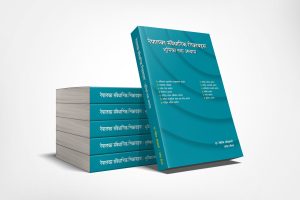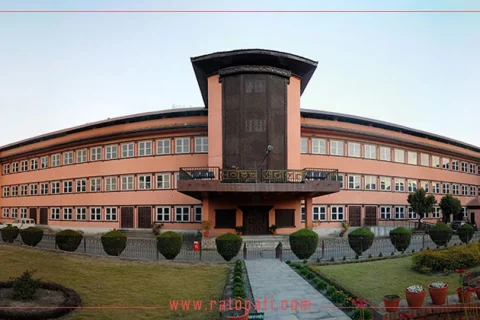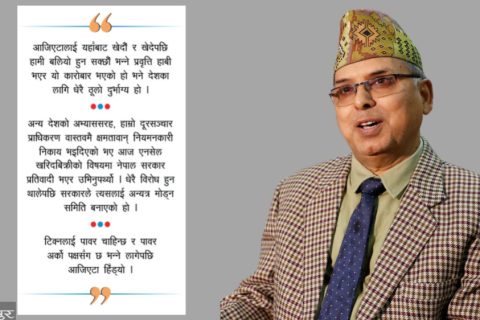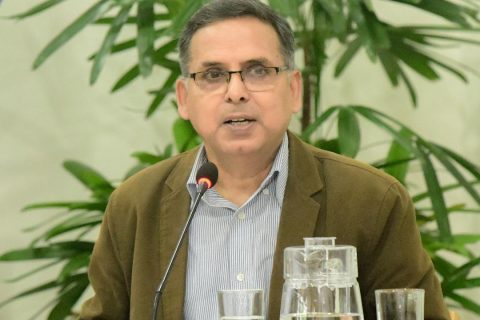Prime Minister Sher Bahadur Deuba is seeking the main opposition’s support to ratify the US grant as his key coalition partner, Maoist Centre, is playing spoilsport.
Amid growing pressure on Nepal from the United States for parliamentary ratification of the MCC compact, there remains one question—whether Speaker Agni Sapkota could play a spoilsport.
Prime Minister Sher Bahadur Deuba appears ready to put the Millennium Challenge Corporation Nepal Compact to a vote in the House. His key coalition partner Communist Party of Nepal (Maoist Centre) is against its ratification “in the existing form”, even though its chair Pushpa Kamal Dahal had sought four-five months from the MCC headquarters for building national consensus. The five-month period ends on February 28.
Sapkota is a long-time ally of Dahal, and if his consultations in recent days to build an opinion on the MCC’s ratification are anything to go by, he appears to be toeing the line of Dahal, his chairman until he was elected to the post of Speaker.
Deuba, meanwhile, has been seeking UML’s support to ratify the compact. The UML has been obstructing the House for months protesting against Sapkota’s failure to take cognizance of the party’s decision to expel its 14 lawmakers, including Madhav Nepal, in August last year. Those expelled lawmakers now have a new party—CPN (Unified Socialist).
There’s a general understanding in both the Congress and the UML that Sapkota’s removal as Speaker could pave the way for the compact’s ratification, according to multiple leaders from both the parties the Post spoke to.
The UML has been publicly blaming the Speaker for the delay in tabling the MCC compact in Parliament.
Addressing an orientation for his party’s provincial committees, Oli said on Friday that Sapkota has been stopping the MCC compact from being tabled in the House.
“The Speaker doesn’t have the authority to stop the government’s proposal from being tabled in the House. Such a move is beyond his jurisdiction,” said Oli.
Min Bishwakarma, a Central Working Committee member of the Nepali Congress, said it is clear that Sapkota is not in favour of the compact’s ratification.
“We are still working to create an environment to table the MCC compact in the upcoming meeting of the House,” he told the Post. “It, however, will depend on the position of the Maoist Centre and the Unified Socialist and the role of the Speaker.”
Though both the Congress and the UML believe removing Sapkota could make it easier—and the constitution does have a provision for removing the Speaker—to table the compact, the question is who is going to make the move.
A UML leader said that both the Congress and the UML believe Sapkota will not allow tabling of the compact.
“The path will be clear only after the Speaker is removed from the post,” said the UML leader who is close to Oli. “However, there are differences as to who would register an impeachment motion against the Speaker.”
Article 91 (6) (C) of the constitution says the Speaker’s position becomes vacant if a resolution is passed by a majority of two-thirds of the total number of the then members of the House of Representatives that his or her conduct is not compatible with his or her office.
The 275-member lower house currently has just 271 members. As many as 181 lawmakers must vote for the motion to unseat Sapkota. The UML and Congress, however, don’t have the number. The largest party has 98 lawmakers while Congress has 61, which makes them short of 22 lawmakers.
Since the Maoist Centre and the CPN (Unified Socialist), which control 49 and 23 seats respectively, are unlikely to vote for removing Sapkota, the Congress and the UML have to get the Janata Samajbadi Party (19 votes) and Loktantrik Samajbadi Party (13 votes) on board.
The Janata Samajbadi Party, however, is divided over the compact, with a faction led by Baburam Bhattarai in favour of the US grant and party chair Upendra Yadav demanding revision of the compact’s terms. If the Bhattarai faction makes a move, it could even lead to a split in the Janata Samajbadi Party.
The UML says as it is the government’s responsibility to get the MCC compact endorsed, Congress should register a proposal to remove the Speaker if it thinks Sapkota is the hurdle.
“We are ready to second the motion if the Congress registers it,” Sher Bahadur Tamang, a UML politburo member, told the Post.
Congress, however, says as Sapkota belongs to the Maoist Centre, which is a coalition partner, it would be unethical for it to table the proposal.
“We want the UML to register the motion,” said a Congress leader. “The discussions are ongoing.”
The meeting of the House of Representatives has been deferred continuously since January 2. The last two meetings were postponed at the last hour.
Congress leaders say they still believe the incumbent alliance will reach an agreement on creating an environment for tabling the MCC compact at Sunday’s meeting of the House.
But time is running out.
The US has communicated to the Nepali leadership that failure to ratify the compact within the deadline will have serious ramifications for Nepal.
A Congress Central Working Committee member said Prime Minister Deuba wants the compact’s ratification because failing to do so will tarnish Nepal’s image and credibility.
“We will wait for two more days for the Maoist Centre and the CPN (Unified Socialist),” said the leader on the condition of anonymity. “We will be forced to seek the UML’s support if there is no agreement in the ruling alliance in two days. This means a motion will be registered to unseat Sapkota either by the UML or by the Congress itself.”
The leader said that Congress believes it will get the support of the Janata Samajbadi Party to remove the Speaker.
“We only need Loktantrik Samajbadi Party’s support to produce a two-third majority,” said the leader.
Constitutional experts say the job of the Speaker as a presiding officer is to facilitate tabling of the government’s bills and proposals and hold deliberations on them and put them to vote.
“A Speaker who fails to perform these responsibilities is generally subjected to removal through an impeachment motion (by a two-thirds majority),” said Bipin Adhikari, a professor and a former dean at Kathmandu University School of Law.










